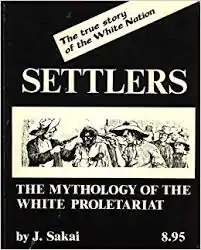Settlers: The Mythology of the White Proletariat
Settlers: The Mythology of the White Proletariat is a 1983 book credited to 'J. Sakai' that looks at the history of the United States of America (referred to as Amerika throughout the book) from an anti-imperialist and non-white perspective. The book was influenced by far-left (particularly Maoist) thought,[1] and has in turn influenced Third-Worldists, in particular Maoist–Third Worldists.[2]
 | |
| Author | J. Sakai |
|---|---|
| Country | United States |
| Language | English |
| Subject | Imperialism, Maoism–Third Worldism, Racism, White supremacy |
Publication date | 1983 |
| ISBN | 9781629630762 |
| OCLC | 886112359 |
| 320 | |
| LC Class | E184 .A1 .S253 |
Summary
Settlers argues that the class system in the United States is built upon the genocide of Native Americans and the enslavement of Africans (referred to as Afrikans throughout the book) and that the white working class in the United States constitutes a privileged labor aristocracy that lacks proletarian consciousness. Arguing that the white working class possesses a petit-bourgeois and reformist consciousness, the book posits that the colonized peoples of the United States constitutes its proletariat.[3]
Reception
Various authors were critical of the book. The Monthly Review describes the book as "preposterous on its face" and "an insult to those whites who have suffered the grossest exploitation and still do."[4] The Communist Party USA says the book "reveals the author’s bias against working-class unity and plays into the hands of the ruling class".[5]
In his book Continuity and Rupture, J. Moufawad-Paul cited Settlers as a "subterranean movement text" that is an example of a revival of Maoist thought in the late 20th century at a time that Marxism-Leninism was waning.[6]
Settlers has influenced the political thought of David Gilbert, a Weather Underground militant, and included commentary on the work in the 2017 reissue of Gilbert's Looking at the White Working Class Historically.[7]
Publication history
Settlers was originally published in 1983 under the title Mythology of the White Proletariat: A Short Course in Understanding Babylon.[8] The fourth edition was issued in 2014 under the title Settlers: The Mythology of the White Proletariat from Mayflower to Modern.[9]
References
- "SETTLERS: THE MYTHOLOGY OF THE WHITE PROLETARIAT FROM MAYFLOWER TO MODERN - J. SAKAI". Out Here. 2020-09-09. Retrieved 2023-09-15.
- strugglesessions (2020-05-12). "Maoism V.s. "Maoist Third Worldism": Responding to Criticism From a Reader". Ex-Struggle Sessions. Retrieved 2023-09-15.
- "Race and class in the United States: J. Sakai and the politics of revolution". Links International Journal of Socialist Renewal. Retrieved 2020-01-20.
- Michael D. Yates (March 2018). "Thinking Clearly about the White Working Class". Monthly Review.
- Bender, Albert (12 May 2022). "What's at stake in the settler colonial debate". cpusa.org.
- Rastgar, Hamayon (21 December 2016). "Continuity and Rupture: Philosophy in the Maoist Terrain". Marx & Philosophy Review of Books. Retrieved 2020-01-20.
- "Thinking Clearly about the White Working Class". Monthly Review. March 2018. Retrieved 2020-01-20.
- Sakai, J. (1983). The Mythology of the White Proletariat: A Short Course in Understanding Babylon. Morningstar Press.
- Sakai, J. (2014). Settlers: The Mythology of the White Proletariat from Mayflower to Modern. PM Press. ISBN 978-1-62963-037-3.